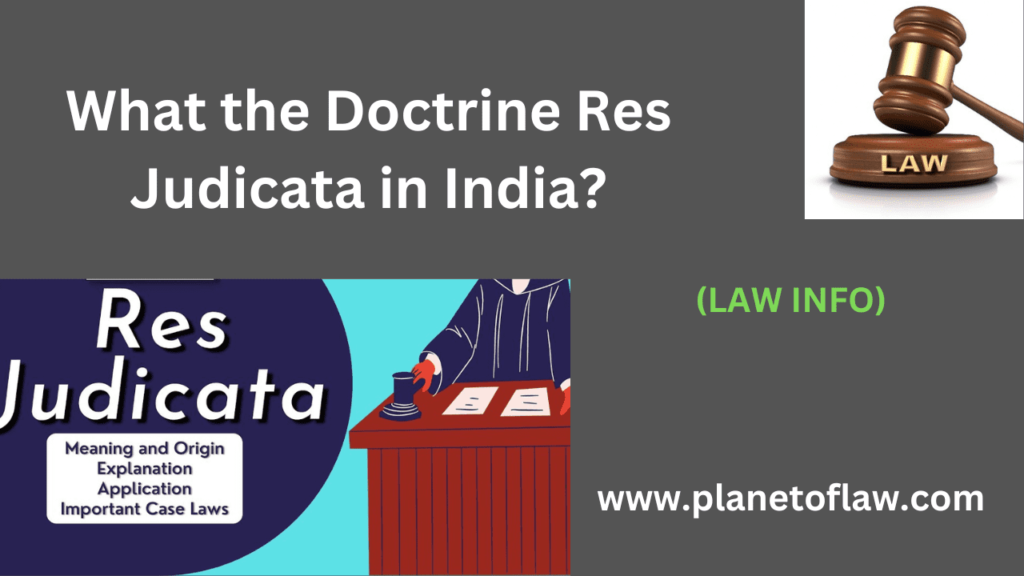Introduction-
What the Doctrine Res Judicata in India?
What are the essential elements of Res Judicata?
What is the background history Doctrine of Res Judicata?
What is the difference between collateral estoppel and Res Judicata?
What are the Landmark Judgement regarding Res Judicata in India?
Critical Analysis of Doctrine of Res Judicata-
The doctrine of Res Judicata, while serving important objectives such as promoting finality, efficiency, and fairness in the legal system, has also faced criticism and calls for reevaluation. Here’s a critical analysis of the doctrine:
- Access to Justice: One of the primary criticisms of Res Judicata is that it can sometimes limit access to justice, particularly for individuals with legitimate claims or defenses that were not adequately presented or addressed in previous litigation. This could be due to factors such as lack of legal representation, procedural complexities, or inadequate resources.
- Inflexibility: Res Judicata is criticized for its inflexibility in certain situations where justice may demand reconsideration of previously decided issues. This inflexibility can lead to unjust outcomes, especially when new evidence or legal arguments emerge that were not available during the earlier litigation.
- Complexity and Technicality: The application of Res Judicata can be complex and technical, leading to confusion and inconsistency in its interpretation and application by courts. This complexity may create uncertainty for litigants and undermine public confidence in the legal system.
- Impact on Judicial Efficiency: While Res Judicata aims to promote judicial efficiency by preventing repetitive litigation, it can sometimes result in inefficient outcomes, particularly when parties engage in strategic litigation tactics to exploit loopholes or delay proceedings.
- Rigid Application: Critics argue that the rigid application of Res Judicata may not always serve the interests of justice, especially in cases involving evolving legal principles or where the previous judgment was based on erroneous legal reasoning or factual inaccuracies.
- Exceptions and Limitations: While Res Judicata includes certain exceptions and limitations, such as fraud, collusion, or lack of jurisdiction, critics contend that these exceptions may not always provide adequate relief in cases of miscarriage of justice or where genuine errors occurred in the previous litigation.
- Overburdened Courts: In jurisdictions with heavy caseloads, the strict application of Res Judicata may exacerbate the burden on courts by encouraging parties to initiate multiple proceedings or appeals to circumvent the doctrine’s application.
In conclusion, while Res Judicata plays a crucial role in maintaining the integrity and efficiency of the legal system, it also faces legitimate criticisms regarding its impact on access to justice, inflexibility, complexity, and potential for unjust outcomes. There is a need for ongoing evaluation and refinement of the doctrine to strike an appropriate balance between finality and fairness in legal proceedings.
Conclusion-
In conclusion, the doctrine of Res Judicata holds significant importance in the Indian legal system, serving as a cornerstone principle that promotes finality, efficiency, and fairness in judicial proceedings. Through the application of Res Judicata, courts aim to prevent repetitive litigation, ensure consistency in legal outcomes, and preserve the integrity of the judicial process.
However, while Res Judicata contributes to the stability and certainty of legal relations, its rigid application can sometimes lead to challenges, including limitations on access to justice, complexity in interpretation, and potential injustices in certain cases.
Therefore, while recognizing the vital role of Res Judicata, there is a need for a balanced approach that considers both the principles of finality and fairness, with flexibility to address exceptional circumstances and evolving legal realities. Continuous evaluation and refinement of Res Judicata principles are essential to uphold the rule of law and maintain public confidence in the Indian legal system.

